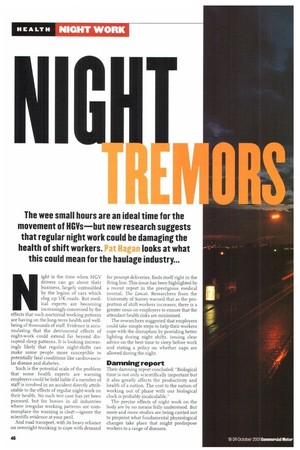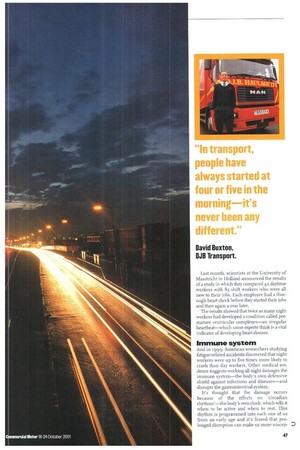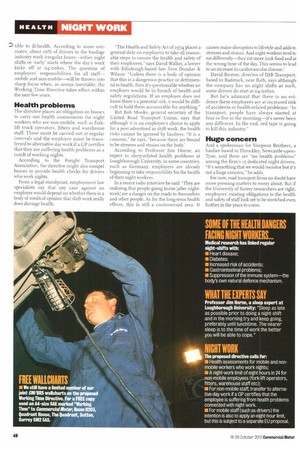N ight is the time when HGV drivers can go about
Page 46

Page 47

Page 48

If you've noticed an error in this article please click here to report it so we can fix it.
their business, largely untroubled by the legion of cars which clog up UK roads. But medical experts are becoming increasingly concerned by the effects that such nocturnal working patterns are having on the long-term health and wellbeing of thousands of staff. Evidence is accumulating that the detrimental effects of night-work could extend far beyond disrupted sleep patterns. It is looking increasingly likely that regular night-shifts can make some people more susceptible to potentially fatal conditions like cardiovascular disease and diabetes.
Such is the potential scale of the problem that some health experts are warning employers could be held liable if a member of staff is involved in an accident directly attributable to the effects of regular night-work on their health. No such test case has yet been pursued, but for bosses in all industries where irregular working patterns are commonplace the warning is cleft—ignore the scientific evidence at your peril.
And road transport, with its heavy reliance on overnight trunking to cope with demand
for prompt deliveries, finds itself right in the firing line. This issue has been highlighted by a recent report in the prestigious medical journal, The Lancet. Researchers from the University of Surrey warned that as the proportion of shift workers increases, there is a greater onus on employers to ensure that the attendant health risks are minimised.
The researchers suggested that employers could take simple steps to help their workers cope with the disruption by providing better lighting during night shifts, issuing clear advice on the best time to sleep before work and stating a policy on whether naps are allowed during the night.
Damning report
Their damning report concluded: "Biological time is not only scientifically important but it also greatly affects the productivity and health of a nation. The cost to the nation of working out of phase with our biological clock is probably incalculable."
The precise effects of night work on the body are by no means fully understood. But more and more studies are being carried out to pinpoint what fundamental physiological changes take place that might predispose workers to a range of diseases.
David Buxton, DJB Transport.
Last month, scientists at the University of Maastricht in Holland announced the results of a study in which they compared 42 daytime workers with 83 shift workers who were all new to their jobs. Each employee had a thorough heart check before they started their jobs and then again a year later.
The results showed that twice as many night workers had developed a condition called premature ventricular complexes—an irregular heartbeat—which some experts think is a vital indicator of developing heart disease.
Immune system
And in 1999, American researchers studying fatigue-related accidents discovered that night workers were up to five times more likely to crash than day workers. Other medical evidence suggests working all night damages the immune system—the body's own defensive shield against infections and diseases—and disrupts the gastrointestinal system.
It's thought that the damage occurs because of the effects on 'circadian rhythms'—the body's own clock, which tells it when to be active and when to rest. This rhythm is programmed into each one of us from an early age and it's feared that prolonged disruption can make us more suscep
Z. tible to ill-health. According to some estimates, about ro% of drivers in the haulage industry work irregular hours—either night shifts or 'early' starts where the day's work kicks off at o400hrs. The question of employers responsibilities for all staff— mobile and non-mobile—will be thrown into sharp focus when, as seems inevitable, the Working Time Directive takes effect within the next few years.
Health problems
The directive places an obligation on bosses to carry out health assessments for night workers who are non-mobile, such as forklift truck operators, fitters and warehouse staff. These must be carried out at regular intervals and the employee must be transferred to alternative day work if a GP certifies that they are suffering health problems as a result of working nights.
According to the Freight Transport Association, the directive might also compel bosses to provide health checks for drivers who work nights.
From a legal standpoint, employment law specialists say that any case against an employer would depend on whether there is a body of medical opinion that shift work really does damage health. "The Health and Safety Act of 1974 places a general duty on employers to take all reasonable steps to ensure the health and safety of their employees," says David Walker, a lawyer with Edinburgh-based law firm Dundas Wilson: "Unless there is a body of opinion that this is a dangerous practice or detrimental to health, then it's questionable whether an employer would be in breach of health and safety regulations. If an employer does not know there's a potential risk, it would be difficult to hold them accountable for anything."
But Bob Monks, general secretary of the United Road Transport Union, says that although it is an employee's choice to apply for a post advertised as shift work, the health risks cannot be ignored by hauliers. "It is a concern," he says, "because there are bound to be stresses and strains on the body.'
According to Professor Jim Home, an expert in sleep-related health problems at Loughborough University, in some countries, such as Germany, employers are already beginning to take responsibility for the health of their night workers.
In a recent radio interview he said: "They are realising that people going home [after nightworkl are a danger on the roads to themselves and other people. As for the long-term health effects, this is still a controversial area. It causes major disruption to lifestyle and adds to stresses and strains. And night workers tend to eat differently—they eat more junk food and at the wrong time of the day. This seems to lead to an increase in cardiovascular disease.'
David Buxton, director of DJ B Transport, based in Radstock, near Bath, says although the company has no night shifts as such, some drivers do start at oq.:oohrs.
But he's adamant that there is no evidence these employees are at increased risk of accidents or health-related problems: "In transport, people have always started at four or five in the morning—it's never been any different. In the end, red tape is going to kill this industry."
Huge concern
And a spokesman for Simpson Brothers, a haulier based in Throcldey, Newcastle-uponTyne, said there are "no health problems" among the firm's 15 dedicated night drivers. "It's something that we would monitor but it's not a huge concern," he adds.
For now, road transport firms no doubt have more pressing matters to worry about. But if the University of Surrey researchers are right, employers' existing obligations to the health and safety of staff look set to be stretched even further in the years to come.












































































































































